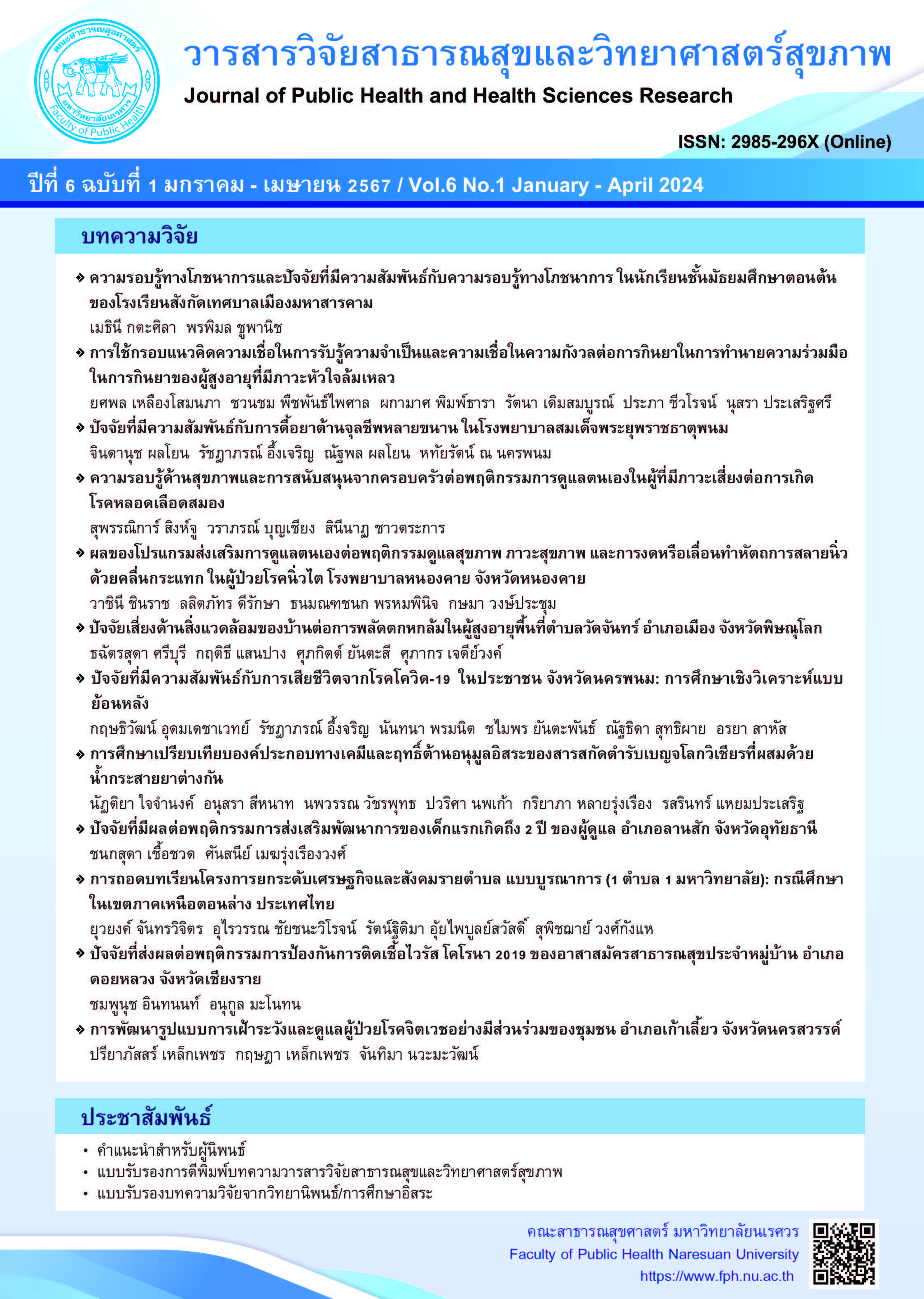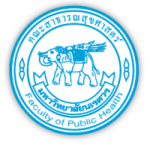ผลของโปรแกรมส่งเสริมการดูแลตนเองต่อพฤติกรรมดูแลสุขภาพ ภาวะสุขภาพ และการงดหรือเลื่อนทำหัตถการสลายนิ่วด้วยคลื่นกระแทก ในผู้ป่วยโรคนิ่วไต โรงพยาบาลหนองคาย จังหวัดหนองคาย
คำสำคัญ:
โปรแกรมส่งเสริมการดูแลตนเอง, พฤติกรรมดูแลสุขภาพ, ภาวะสุขภาพ, หัตถการสลายนิ่วด้วยคลื่นกระแทกบทคัดย่อ
การศึกษานี้มีวัตถุประสงค์เพื่อประเมินผลโปรแกรมส่งเสริมการดูแลตนเอง ต่อพฤติกรรมดูแลสุขภาพภาวะสุขภาพ และการงดหรือเลื่อนทำหัตถการสลายนิ่วด้วยคลื่นกระแทก ในผู้ป่วยโรคนิ่วไต โรงพยาบาลหนองคายจังหวัดหนองคาย กลุ่มตัวอย่างจำนวน 60 คน แบ่งเป็นกลุ่มทดลอง 30 คน และกลุ่มเปรียบเทียบ 30 คน เก็บข้อมูลทั่วไป พฤติกรรมดูแลสุขภาพ ภาวะสุขภาพ การงดหรือเลื่อนทำหัตถการ ด้วยแบบสัมภาษณ์และแบบบันทึกข้อมูลกลุ่มทดลองได้รับโปรแกรมส่งเสริมการดูแลตนเอง กลุ่มเปรียบเทียบได้รับการดูแลตามมาตรฐานปกติ วิเคราะห์ข้อมูลทั่วไปโดยใช้สถิติเชิงพรรณนา เปรียบเทียบคะแนนเฉลี่ยพฤติกรรมดูแลสุขภาพ และภาวะสุขภาพ ภายในกลุ่มและระหว่างกลุ่ม โดยใช้สถิติ Paired t-test และ Independent t-test เปรียบเทียบสัดส่วนภาวะสุขภาพ และการงดหรือเลื่อนทำหัตถการระหว่างกลุ่ม ใช้สถิติ Z-test กำหนดนัยสำคัญทางสถิติที่ระดับค่า p-value น้อยกว่า 0.05
ผลการศึกษา พบว่า หลังเข้าร่วมโปรแกรม กลุ่มทดลองมีค่าเฉลี่ยคะแนนพฤติกรรมดูแลสุขภาพด้านความรู้และด้านพฤติกรรมส่งเสริมการขับนิ่วสูงกว่าก่อนเข้าร่วมโปรแกรม และสูงกว่ากลุ่มเปรียบเทียบ อย่างมีนัยสำคัญทางสถิติ เมื่อเปรียบเทียบค่าเฉลี่ยคะแนนภาวะสุขภาพ พบว่า หลังเข้าร่วมโปรแกรม กลุ่มทดลองมีค่าเฉลี่ยคะแนนภาวะสุขภาพความปวดต่ำกว่ากลุ่มเปรียบเทียบ อย่างมีนัยสำคัญทางสถิติ ผลการศึกษานี้ แสดงให้เห็นว่าโปรแกรมส่งเสริมการดูแลตนเอง ทำให้ผู้ป่วยมีความรู้ความเข้าใจเรื่องโรคนิ่วไต และมีพฤติกรรมส่งเสริมการขับนิ่วดีขึ้น อีกทั้ง ช่วยลดความปวดของผู้ป่วยหลังสลายนิ่วได้ ซึ่งเป็นอีกแนวทางหนึ่งที่บุคลากรทางสาธารณสุข สามารถประยุกต์ใช้ส่วนสำคัญของโปรแกรม โดยบูรณาการกับแนวทางมาตรฐานปกติในการดูแลและส่งเสริมสุขภาพเบื้องต้นในผู้ป่วยสลายนิ่วด้วยคลื่นกระแทก
References
Abdelmowla, R. A., Shahat, A. A., Abdelmowla, H. A., Hussein, A. H., Gamal, R. M., Mohammad, Z.A. et al. (2018). Health education protocol for patients undergoing shock wave lithotripsy for urolithiasis. IOSR Journal of Nursing and Health Science, 7(1), 11-16.
Abdelwahab, D., Alaa El-deen, S., Rezian, A., & Elhkouly, A. (2021). Effect of implementing evidence-based guidelines on lifestyle modification for adult patients with renal stone undergoing ESWL procedure. Egyptian Journal of Nursing and Health Sciences, 2(1), 13-52.
Aldaher, H. S., Kadhim, S. Z., Al-Roub, N. M., Alsadi, A. H., Salam, D. A., & Tillo, E. A. (2021). Evaluating the understanding of kidney stones among adults in the United Arab Emirates. Journal of Taibah University Medical Sciences, 16(5), 788-793.
Badawy, A.I. (2019). The effect of pre-procedure teaching module for patients undergoing shock wave lithotripsy on anxiety, claustrophobia, pain perception, and urolithiasis clearance. Texila International Journal of Nursing, 5(1), 1-13.
Bloom, B. S., Englehart, M. D., Furst, E. J., Hill, W. H., & Krathwohl, D. R. (1956). Taxonomy of educational objectives: The classification of educational goals. Handbook I: Cognitive domain. New York: David Mckay.
Bos, D., Abara, E., & Parmar, M. S. (2014). Knowledge, attitudes, and practice patterns among health care providers in the prevention of recurrent kidney stones in Northern Ontario. Canadian Urological Association Journal, 8(11-12), E795–E804.
Duangsai, S. & Chinnawong, T. (2021). Effect of 5 A’s self-management support program on self-management behaviors in patients with uncontrolled hypertension. Journal of Research in Nursing-Midwifery and Health Sciences, 41(4), 74-85. (in Thai)
Elsayed, N. F. (2019). Impact of nursing protocol on stone clearance rate and acute complications following extracorporeal shock waves lithotripsy. International Journal of Novel Research in Healthcare and Nursing, 6(3), 648-658.
Gaberson, K. B. (1991). The effect of humorous distraction on preoperative anxiety: A pilot study. AORN Journal, 54(6),1258-1264.
Glasgow, R. E., Emont, S., & Miller, D. C. (2006). Assessing delivery of the five ‘As’ for patientcentered counseling. Health promotion international, 21(3), 245-255.
Jirawatkun, A. (2015). Statistics for health science research (4th ed.). Bangkok: Witthayaphat.
Kasab, N., Basal, A., EL-Tatawy, H., & Mohamed, A. (2023). Effect of implementing nursing guidelines on clinical outcomes for patients undergoing extracorporeal shock waves lithotripsy for urolithiasis. Tanta Scientific Nursing Journal, 28(1), 86-105.
Kijnugool, S., Ketkaew, P., Autaipattanasak, P., Srinualnad, S., & Jitpraphai, S. (2018). Efficacy of educational program for patients receiving transrectal ultrasound guided prostate biopsy. Siriraj Medical Bulletin, 11(2), 81-87. (in Thai)
Koyama, T., McHaffie, J. G., Laurienti, P. J., & Coghill, R. C. (2005). The subjective experience of pain: Where expectations become reality. Proceedings of the National Academy of Sciences, 102(36), 12950-12955.
Li, C. C., & Zhang, Z. W. (2022). Effect of precision health education on compliance behavior after Extracorporeal Shock Wave Lithotripsy. Computational and mathematical methods in medicine, 306036. https://doi.org/10. 1155/2022/3306036.
Melzack, R., & Wall, P. D. (1965). Pain mechanisms: A new theory. Science, 150(3699), 971-979.
Ministry of Public Health. (2022, September 4). Illness report summary. Retrieved June 22, 2023, from https://spd.moph.go.th/wp-content/uploads/2023/04/ill_2020_full_27092021-v2.pdf. (in Thai)
Mohammed Abd El Guid, S., Mosaad Ali, M., & Elsayed Ghoneem, S. (2023). Effect of evidence based guidelines on health outcomes among patients undergoing extracorporeal shock waves lithotripsy for Urolithiasis. Journal of Nursing Science Benha University, 4(1), 1-23.
Mohammed, R. F., Mohammed, Z. A., Fathi, A. H., & Mohamed, J. A. (2015). Impact of health education program for elderly patients undergoing extracorporeal shock waves lithotripsy on clearance of urolithiasis. Journal of American Science, 11(6), 188-200.
Nongkhai Hospital. (2020). Data service statistics. Nongkhai: Department of Anesthesiology Nongkhai Hospital. (in Thai)
Nonjui, P. (2021). Health Education. Srinagarind Medical Journal, 36(2), 246-251. (in Thai)
Pakanta, I., Boonprasit, W., & Rattanawimol, C.(2010). The effects of self-regulation program on patients' anxiety, pain, and distress during extracorporeal shock waves lithotripsy. Journal of Nursing and Health Sciences, 4(2), 13-27. (in Thai)
Promkasikorn, L. (2015). The factors predicting the health behaviors related to the occurrence of kidney stone formation among kidney stone disease patients. Thesis of Master of Nursing Science, Thammasat University, Bangkok. (in Thai)
Roozitalab, M., Hosseini, N., Vossoughi, M., & Zoladl, M. (2022). Effect of intervention based on 5A self-management model on the fatigue severity of patients with cancer under chemotherapy. Journal of Clinical Care and Skills, 1(2), 63-69.
Sapworarit, O. (2017). Effect of structured health education to decrease anxiety and satisfaction of patients with extracorporeal shock waves lithotripsy at Suratthani Hospital. Region 11 Medical Journal, 31(4), 639-648. (in Thai)
Smith, B. B., Smith, M. M., Hyder, J. A., Mauermann, W. J., Warner, M. E., Licatino, L. K. et al. (2018). Same-day cancellation in ambulatory surgery a retrospective review at a large academic tertiary referral center. Journal of Ambulatory Care Management, 41(2), 118-127.
Sonjai, W. (2021). The effects of self-management on health behaviors and kidney function of patients with chronic kidney injury stage 3. Journal of Health Science Research, 15(3), 120-132. (in Thai)
Taha, N., Hussein, A., El-Nagar, S., El-Bready, H., & Saboula, N. (2019). Pattern of prior related behavior, self-efficacy and health promoting behavior among kidney stone adult patients. IOSR Journal of Nursing and Health Science, 8(4), 7-20.
Thakore, P., & Liang, T. H. (2022, June 11). Urolithiasis. Retrieved October 9, 2021, from https://www.ncbi.nlm.nih.gov/books/NBK559101/.
Trongmatee, K. & Polsook, R. (2020). Effects of a self-efficacy enhancement program on recurrence prevention behaviors among patients with urolithiasis. Chulalongkorn Medical Journal, 64(1), 79-85.
Tubsaeng, P., Srisarakham, P., & Nueaiytong, K. (2022). Treatment outcomes and factors affecting the success of extracorporeal shockwave lithotripsy in urinary stone treatment: A study of ten years of data from Mahasarakham Hospital. Insight Urology, 43(1), 33-40.
Usawachintachit, M. (2020). Acute renal colic. In Chotikavanij, A. (Ed.), Urological Emergency. Nonthaburi: Beyond Enterprise. (in Thai)
Wagenius, M., Jakobsson, J., Stranne, J., & Linder, A. (2017). Complications in extracorporeal shockwave lithotripsy: A cohort study. Scandinavian Journal of Urology, 51(5), 407-413.
Zhang, D., Liang, Z., Wang, D., Lv, J., Ding, D., & Yu, D. (2022). The clinical efficacy and safety of extra corporeal shock waves lithotripsyin the treatment of patients with urinary calculi. Disease markers, 3468692. https://doi.org/10.1155/2022/3468692.
Downloads
เผยแพร่แล้ว
How to Cite
ฉบับ
บท
License
Copyright (c) 2024 วารสารวิจัยสาธารณสุขและวิทยาศาสตร์สุขภาพ

This work is licensed under a Creative Commons Attribution-NonCommercial-NoDerivatives 4.0 International License.
บทความที่ได้รับการตีพิมพ์เป็นลิขสิทธิ์ของวารสารวิจัยสาธารณสุขและวิทยาศาสตร์สุขภาพ
ข้อความที่ปรากฏในบทความแต่ละเรื่องบทความในวารสารวิชาการและวิจัยเล่มนี้เป็นความคิดเห็นส่วนตัวของผู้เขียนแต่ละท่านไม่เกี่ยวข้องกับมหาวิทยาลัยนเรศวร และคณาจารย์ท่านอื่นๆในมหาวิทยาลัยฯ ความรับผิดชอบเกี่ยวกับบทความแต่ละเรื่องผู้เขียนจะรับผิดชอบของตนเองแต่ละท่าน






